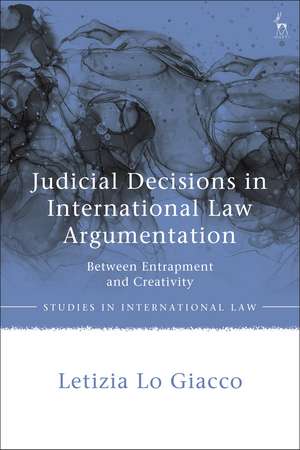Judicial Decisions in International Law Argumentation: Between Entrapment and Creativity: Studies in International Law
Autor Dr Letizia Lo Giaccoen Limba Engleză Paperback – 17 apr 2024
| Toate formatele și edițiile | Preț | Express |
|---|---|---|
| Paperback (1) | 297.50 lei 43-57 zile | |
| Bloomsbury Publishing – 17 apr 2024 | 297.50 lei 43-57 zile | |
| Hardback (1) | 539.57 lei 43-57 zile | |
| Bloomsbury Publishing – 19 oct 2022 | 539.57 lei 43-57 zile |
Din seria Studies in International Law
- 34%
 Preț: 511.07 lei
Preț: 511.07 lei - 30%
 Preț: 538.77 lei
Preț: 538.77 lei - 23%
 Preț: 249.26 lei
Preț: 249.26 lei - 34%
 Preț: 512.30 lei
Preț: 512.30 lei - 21%
 Preț: 275.26 lei
Preț: 275.26 lei - 30%
 Preț: 570.51 lei
Preț: 570.51 lei - 30%
 Preț: 571.24 lei
Preț: 571.24 lei - 30%
 Preț: 598.45 lei
Preț: 598.45 lei - 18%
 Preț: 297.20 lei
Preț: 297.20 lei - 30%
 Preț: 573.05 lei
Preț: 573.05 lei - 30%
 Preț: 1138.79 lei
Preț: 1138.79 lei -
 Preț: 448.37 lei
Preț: 448.37 lei - 30%
 Preț: 571.34 lei
Preț: 571.34 lei - 28%
 Preț: 406.31 lei
Preț: 406.31 lei - 21%
 Preț: 270.97 lei
Preț: 270.97 lei - 30%
 Preț: 570.43 lei
Preț: 570.43 lei - 30%
 Preț: 836.82 lei
Preț: 836.82 lei - 14%
 Preț: 570.43 lei
Preț: 570.43 lei - 30%
 Preț: 512.37 lei
Preț: 512.37 lei - 30%
 Preț: 511.14 lei
Preț: 511.14 lei - 30%
 Preț: 954.11 lei
Preț: 954.11 lei - 30%
 Preț: 572.47 lei
Preț: 572.47 lei - 30%
 Preț: 603.73 lei
Preț: 603.73 lei - 30%
 Preț: 779.50 lei
Preț: 779.50 lei - 14%
 Preț: 837.54 lei
Preț: 837.54 lei - 30%
 Preț: 898.78 lei
Preț: 898.78 lei - 30%
 Preț: 576.40 lei
Preț: 576.40 lei - 30%
 Preț: 719.91 lei
Preț: 719.91 lei - 30%
 Preț: 599.66 lei
Preț: 599.66 lei - 12%
 Preț: 233.46 lei
Preț: 233.46 lei - 30%
 Preț: 779.50 lei
Preț: 779.50 lei - 30%
 Preț: 570.43 lei
Preț: 570.43 lei - 14%
 Preț: 779.09 lei
Preț: 779.09 lei - 30%
 Preț: 540.38 lei
Preț: 540.38 lei - 30%
 Preț: 573.86 lei
Preț: 573.86 lei - 14%
 Preț: 574.92 lei
Preț: 574.92 lei - 28%
 Preț: 500.25 lei
Preț: 500.25 lei - 30%
 Preț: 542.02 lei
Preț: 542.02 lei - 30%
 Preț: 778.12 lei
Preț: 778.12 lei - 30%
 Preț: 540.48 lei
Preț: 540.48 lei - 30%
 Preț: 570.43 lei
Preț: 570.43 lei - 30%
 Preț: 515.24 lei
Preț: 515.24 lei - 30%
 Preț: 573.70 lei
Preț: 573.70 lei - 30%
 Preț: 720.23 lei
Preț: 720.23 lei - 30%
 Preț: 784.00 lei
Preț: 784.00 lei - 22%
 Preț: 571.24 lei
Preț: 571.24 lei - 14%
 Preț: 779.09 lei
Preț: 779.09 lei - 30%
 Preț: 779.91 lei
Preț: 779.91 lei
Preț: 297.50 lei
Preț vechi: 364.73 lei
-18% Nou
Puncte Express: 446
Preț estimativ în valută:
56.93€ • 59.59$ • 47.38£
56.93€ • 59.59$ • 47.38£
Carte tipărită la comandă
Livrare economică 31 martie-14 aprilie
Preluare comenzi: 021 569.72.76
Specificații
ISBN-13: 9781509948987
ISBN-10: 1509948988
Pagini: 232
Dimensiuni: 156 x 234 x 25 mm
Greutate: 0.33 kg
Editura: Bloomsbury Publishing
Colecția Hart Publishing
Seria Studies in International Law
Locul publicării:London, United Kingdom
ISBN-10: 1509948988
Pagini: 232
Dimensiuni: 156 x 234 x 25 mm
Greutate: 0.33 kg
Editura: Bloomsbury Publishing
Colecția Hart Publishing
Seria Studies in International Law
Locul publicării:London, United Kingdom
Caracteristici
Draws on historical judgments from a range of key judicial bodies in the field
Notă biografică
Letizia Lo Giacco is Assistant Professor of Public International Law at Leiden University, the Netherlands.
Cuprins
1. Introduction I. The 'Judicialisation Turn' in International Law II. Arguments III. Legal Interpretation as a Form of Argumentation IV. Scope and Limits of the Book V. Book Outline 2. Courts and the Argumentation of International Law I. A Legal Realist Perspective on Courts II. Discretion in Legal Interpretation A. Rule-Bound JustificationB. Choosing between Competing Courses of Action III. Courts' Argumentation: Between Logic and Persuasion IV. Governing Judicial Decisions A. Following Judicial Decisions: An Internal Perspective B. Judicial Decisions as a Sufficient Basis of Justification in the Practice of International Criminal Law? 3. Rethinking Judicial Decisions beyond Formal Architectures I. Genesis and Historical Development of International Criminal Law: A Plurality of Courts II. General Effects of Regime Development III. The Seeds of Universalism IV. National Courts and International Crimes V. Approaching Judicial Decisions in National Adjudication VI. Courts Citing Judicial Decisions: An Interim Evaluation 4. The Entrapment of Judicial Decisions I. Citing Judicial Decisions as a Structuring Device: Incrementalism versus Revisionism II. The Road Towards the Stabilisation of Interpretive Outcomes A. Interpreting 'Protected Group' in Genocide Cases B. Discretion in the Interpretive Practices of 'Protected Group' C. Accepting Interpretive Outcomes: The Import of the ICC Statute D. Interpretation as an Incremental Process of Content Formation III. Deferring to the International Acquis: The Role of National Courts in Interpreting 'Protected Group' IV. From Stabilisation to Perfect Alignment of Interpretive Outcomes: The Case of 'Armed Conflict' A. The Concept of Armed Conflict in International Jurisdictions B. National Courts between Entrapment and Revisionism V. Interim Conclusions 5. Rewriting the Meaning of International Law I. Social Acceptance as a Validator of Correctness: Any Room for Change? II. Departing from the 'Established Jurisprudence': The Case of Genocide III. Revisiting the Concept of 'Unlawful Combatants' IV. Managing the Flow of Arguments through Epistemic Superiority V. Judicial Decisions as 'Persuasive Authority' VI. Authoritative Statements as Knowledge on International Criminal Law 6. Rethinking the Judicialisation Era I. Structural Changes in International Legal Argumentation II. Judicial Decisions as Epistemic Tools in the Argumentation of International Law III. Reassessing the Role of Judicial Decisions in International Law: A RetrospectiveIV. The Way Forward: A Prospective
